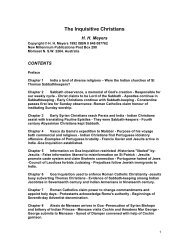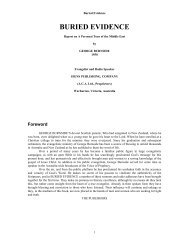Battle of the Bibles - Present Truth
Battle of the Bibles - Present Truth
Battle of the Bibles - Present Truth
You also want an ePaper? Increase the reach of your titles
YUMPU automatically turns print PDFs into web optimized ePapers that Google loves.
The laity were still not impressed. Lagging behind and failing to celebrate <strong>the</strong><br />
interconfessional exploits <strong>of</strong> <strong>the</strong>ir adventurous administrators, <strong>the</strong>y would soon be made<br />
to see what was good for <strong>the</strong>m.<br />
The coup de grace came in 1985 in <strong>the</strong> form <strong>of</strong> "The Seventh-day Adventist<br />
Hymnal". This is <strong>the</strong> first time that <strong>the</strong> contents <strong>of</strong> any hymn book has received <strong>the</strong><br />
imprimatur <strong>of</strong> <strong>the</strong> General Conference <strong>of</strong> Seventh-day Adventists by <strong>the</strong> incorporation <strong>of</strong><br />
its name in <strong>the</strong> title.<br />
After voting for this hymnal, mostly sight unseen, church members were in for a<br />
real shock. Aside from some hymns that were distinctly Roman Catholic in sentiment<br />
and even liturgy, it contained an extensive section <strong>of</strong> Scriptures for corporate reading as<br />
well as a smaller section for corporate prayers and canticles - a new and radical<br />
departure for an historically conservative Protestant church.<br />
In view <strong>of</strong> <strong>the</strong> craven desire <strong>of</strong> <strong>the</strong> church leadership to promote modern<br />
versions, it should not be surprising to find that <strong>the</strong> Hymnal Committee and <strong>the</strong> hierarchy<br />
which supported <strong>the</strong>m, took this opportunity to coerce Adventist congregations into<br />
mouthing Scriptures which <strong>the</strong>y had hi<strong>the</strong>rto rejected and ignored. Members were<br />
shocked to find that this hymnal slighted <strong>the</strong>ir beloved King James Bible by practically<br />
ignoring it! Out <strong>of</strong> some 224 Scripture Readings and prayers intended for corporate<br />
worship, taken from eight Bible versions, <strong>the</strong> KJV was relegated to a very poor seventh<br />
place in frequency <strong>of</strong> use. It was utilised fourteen times only!<br />
The Roman Catholic Jerusalem Bible came in second place being used thirtyeight<br />
times - nearly three times more than <strong>the</strong> KJV! The New International Version<br />
topped <strong>the</strong> list, being used sixty-eight times! One reading, No 852, purporting to be a<br />
rendition <strong>of</strong> Psalm 63:1-5 is nothing more than an anonymous paraphrase!<br />
Indicative <strong>of</strong> <strong>the</strong> Roman influence behind <strong>the</strong> selection <strong>of</strong> <strong>the</strong>se readings is <strong>the</strong><br />
use <strong>of</strong> liturgical terminology which this hymnbook has introduced to Adventist worship.<br />
No 833, taken from Isaiah 6 carries <strong>the</strong> label: "The Sanctus "; No 835 from Luke 1, titled:<br />
"The Song <strong>of</strong> Mary" carries <strong>the</strong> notation, "Commonly called The Magnificat "; and No<br />
836, also from Luke 1, is "Commonly called <strong>the</strong> Benedictus". All three are New King<br />
James Version renditions. No 837, a rendition <strong>of</strong> a portion <strong>of</strong> Luke 2 from <strong>the</strong> Jerusalem<br />
Bible, is "Commonly called The Nunc Dimittis ".<br />
The few times <strong>the</strong> King James Version is used is when very well known and <strong>of</strong>t<br />
repeated texts are quoted. Presumably, <strong>the</strong> Selection Committee was afraid <strong>of</strong> <strong>of</strong>fending<br />
reader's sensibilities by trying to rephrase ingrained memory verses. If so, <strong>the</strong><br />
Committee failed <strong>the</strong> test <strong>of</strong> consistency by quoting John 3:16 from <strong>the</strong> Jerusalem Bible<br />
(No 782). And again, in No 730, <strong>the</strong>y destroyed a beautiful message which announces<br />
God's comprehensive plan <strong>of</strong> salvation for all mankind by quoting Luke 2:14 from <strong>the</strong><br />
NIV. This rendition promotes a selective type <strong>of</strong> gospel with which <strong>the</strong> Roman Church<br />
undoubtedly agrees - "Glory to God in <strong>the</strong> highest and on earth peace to men on whom<br />
His favour rests".<br />
Ano<strong>the</strong>r reading selected from <strong>the</strong> NIV ("Zondervan", 1978) which not only<br />
carries overtones <strong>of</strong> Catholicism, but is positively preposterous, is to be found in No 756.<br />
Here, David is made to say in Psalm 51:5: "Surely I have been a sinner from birth and<br />
sinful from <strong>the</strong> time my mo<strong>the</strong>r conceived me". It is on this assumption that all babies are<br />
born sinners that Rome hastens to baptise as soon as possible after birth. But this<br />
rendition goes fur<strong>the</strong>r; all are sinners from <strong>the</strong> moment <strong>of</strong> conception! But, by <strong>the</strong> time<br />
<strong>the</strong> SDA Hymnal was published in 1985 <strong>the</strong> publishers <strong>of</strong> <strong>the</strong> New International Version<br />
had seen fit to delete this outrage: "and in sin did my mo<strong>the</strong>r conceive me" ("Zondervan",<br />
1984).<br />
11





